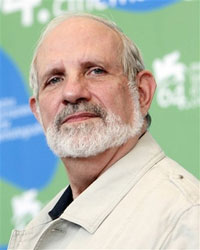Film on abuses by US troops in Iraq stuns Venice
Updated: 2007-08-31 21:59
 Director Brian De Palma poses during the photocall of the film 'Redacted' in competition at the 64th Venice Film Festival, in Venice, Italy, Aug 31, 2007. [AP] |
VENICE - A new film about the real-life rape and killing of a 14-year-old Iraqi girl by US soldiers who also murdered her family stunned the Venice festival, with shocking images that left some viewers in tears.
"Redacted", by US director Brian De Palma, is one of at least eight American films on the war in Iraq due for release in the next few months and the first of two movies on the conflict screening in Venice's main competition.
Inspired by one of the most serious crimes committed by American soldiers in Iraq since the 2003 invasion, it is a harrowing indictment of the conflict and spares the audience no brutality to get its message across.
De Palma, 66, whose "Casualties of War" in 1989 told a similar tale of abuse by American soldiers in Vietnam, makes no secret of the goal he is hoping to achieve with the film's images, all based on real material he found on the Internet.
"The movie is an attempt to bring the reality of what is happening in Iraq to the American people," he told reporters after a press screening.
"The pictures are what will stop the war. One only hopes that these images will get the public incensed enough to motivate their Congressmen to vote against this war," he said.
Abeer Qasim Hamza al-Janabi was gang raped, killed and burnt by American soldiers in Mahmudiya, south of Baghdad, in March 2006. Her parents and younger daughter were also killed.
Five soldiers have since been charged with the attack. Four of them have been given sentences of between 5 and 110 years.
"It is all on the Internet"
Halfway between documentary and fiction, "Redacted" draws on soldiers' home-made war videos, blogs and journals and footage posted on YouTube, reflecting changes in the way the media cover the war.
"In Vietnam, when we saw the images and the sorrow of the people we were traumatising and killing, we saw the soldiers wounded and brought back in body bags. We see none of that in this war," De Palma said.
"It's all out there on the Internet, you can find it if you look for it, but it's not in the major media. The media is now really part of the corporate establishment," he said.
The film's title refers to how, according to De Palma, mainstream American newspapers and television channels are failing to tell the true story of the war by keeping the most graphic images of the conflict away from public opinion.
"When I went out to find the pictures, I said (to the media) give me the pictures you can't publish," he said, adding that because of legal dangers he too had to "edit" the material.
"Everything that is in the movie is based on something I found that actually happened. But once I had put it in the script I would get a note from a lawyer saying you can't use that because it's real and we may get sued," De Palma said.
"So I was forced to fictionalise things that were actually real."
The film, shot in Jordan with a little known cast, ends with a series of photographs of Iraqi civilians killed and their faces blacked out for legal reasons.
"I think that's terrible because now we have not even given the dignity of faces to this suffering people," De Palma said.
"The great irony about Redacted is that it was redacted."
Distributor Magnolia has planned a limited US release for later this year, and the film may be easier to sell to European audiences rather than to the American public.
"This is a harrowing experience you put the audience through. It is not something you want to go to on a delightful Saturday evening but this message must be put forward and hopefully the public will respond," De Palma said.
|
|
|
||
|
||
|
|
|
|